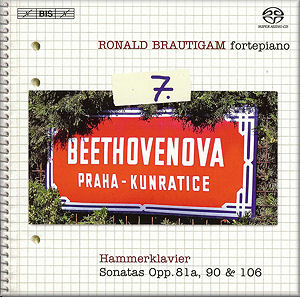 |
 |
|


alternatively
CD: AmazonUK
AmazonUS
Download: Classicsonline
|
Ludwig van BEETHOVEN (1770-1827)
Piano Sonata No. 26 in E flat major, Op. 81a, “Das Lebewohl” (1810)
[15:32]
Piano Sonata No. 27 in E minor, Op. 90 (1814) [12:16]
Piano Sonata No. 29 in B flat major, Op. 106, “Hammerklavier” (1818)
[40:30]
 Ronald Brautigam (fortepiano)
Ronald Brautigam (fortepiano)
rec. Österåker Church, Sweden, August 2007

 BIS SACD 1612 [69:17] BIS SACD 1612 [69:17]

|
|
|
This is Volume 7 of Ronald Brautigam’s complete Beethoven sonata cycle played on the fortepiano. I had read reviews of earlier volumes, but this is the first I have heard. It is beautifully recorded in an only slightly reverberant church acoustic. The booklet features an excellent note by Roeland Hazendonk. I’ve now added the six previous volumes to my list in the post to Father Christmas.
It’s clear that those who log on to MusicWeb International are an erudite bunch, but it might just be that one or two readers have never heard the sound of a fortepiano. The booklet notes tell us that in 1825 Beethoven received a fortepiano made by Conrad Graf. The list of musicians who held Graf’s instruments in high esteem includes Chopin, Robert and Clara Schumann, Liszt, Mendelssohn and Brahms. If one was looking for sponsors one could scarcely do better. The instrument played on this recording is a modern one, built in 2007 by Paul McNulty and based on a Graf instrument dating from around 1819. To ears accustomed only to the modern concert grand, the sound of the fortepiano takes a little getting used to. The tone is less rich, less round than a modern instrument, and with a certain brittle quality. The sustaining power is reduced, and this is particularly noticeable in the higher reaches of the instrument. It is in the treble register, too, that one detects a trace, just a trace, of the sound of the piano that used to stand in grandma’s front room, or in the village hall. Period instrument enthusiasts will cite the remarkable clarity of texture which is possible on the fortepiano, and on the evidence of this recording the claim is justified. I wonder, though, how much of it is really thanks to the piano rather than to the pianist’s astonishingly acute ear and nimble fingers. And I can well imagine such claims provoking snorts of derision from those pianists who would never dream of touching a fortepiano, yet who pass their working lives seeking out textural clarity in Beethoven and other composers.
For a long time I held the view that the period instrument movement was an interesting historical project, but that modern instruments were essential for real musical enjoyment. That was partly the result of some thoroughly unpleasant noises that emanated from period instruments in the early years. I was quite convinced, for example, that Bach would have been thrilled to hear his music played on modern trumpets, for the simple reason that they sounded so much better. But as period trumpet playing has progressed in spectacular fashion in recent years, I’m now not so sure. As to Beethoven on the fortepiano, let’s say that once the present disc was underway I rarely thought about it. Let us also say that Brautigam is a totally convincing advocate for the instrument.
No praise is too high for these performances. In Les Adieux Brautigam captures perfectly the contrasting moods of the three movements, and his remarkable virtuosity is put to purely musical use in the finale. That finale represents the composer’s pleasure at the return of his friend the Archduke Rudolph, but still evokes in my mind nothing so much as the ecstatic joy of some slightly undisciplined dog – of which I’ve had a few – when his master or mistress arrives home. Brautigam tends to keep the music moving in these works, particularly noticeable – and effective – in the short Op. 90 sonata, where he finds just the right tempo for the Schubertian second movement. There were one or two moments in the first movement of Les Adieux where busy textures in the left hand rather overpowered what was happening in the right, but such is the pianist’s authority I feel sure that this was what he intended. One also notes a certain hardness of tone at the top of the instrument when played forte or above; this must surely, I think, be seen as one of the limitations imposed by the instrument.
Brautigam provides a towering performance of the Hammerklavier. Beethoven inserted some fairly hair-raising metronome marks, and Brautigam comes pretty close to them. There is both power and energy in the playing, and although the work pushes the instrument to its absolute limits, there is no feeling of frustration, during the performance, of wanting something different or something more. The second subject group of the slow movement is given with exquisite poise, and there can be no denying the advantage of the period instrument in the passages for crossed hands. Then the finale brings me back to the question of clarity. I don’t think I’ve ever heard the contrapuntal writing more clearly defined than here. The pianist might claim that the instrument helps him out, and it may be so, but it is his dexterity which is truly at the basis of this extraordinary achievement. As for the work itself, and this finale in particular, is there not a case for its inclusion amongst the very greatest products of the human mind? In the cultural realm, what would be, so to speak, the competition? St. Paul’s Cathedral? King Lear? Holbein’s Ambassadors? Beethoven’s astonishing contrapuntal and dramatic feat lays claim to the most prestigious title.
William Hedley
|
|

